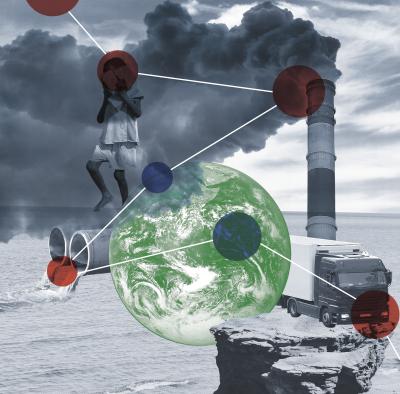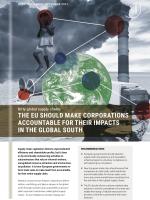The EU should make corporations accountable for their impacts in the global south

- European governments should abandon supply-chain transparency and traceability schemes based on voluntary compliance or self-reporting by companies.
- New European trade rules should ensure that companies are held civilly, administratively and criminally liable for human rights violations and environmental harms resulting from the activities in their global supply chains.
- The EU should reform customs manifest data systems to end the concealment of crimes and enable the tracing of natural resources from producer countries to processors and manufacturers.
Supply-chain capitalism delivers unprecedented efficiency and shareholder profits, but it does so by structurally outsourcing activities to subcontractors that rely on informal workers, unregulated resource extraction and environmental pollution. It is time European governments reform trade rules to make lead firms accountable for their entire supply chain.
Western consumers are linked to calamitous deforestation, overfishing, and labour abuses in the global south through complex and purposefully unaccountable corporate machineries called global supply chains. To avert disastrous climate change and promote social justice, we need to reform global supply chains. As the European Union is drafting a law on ‘Sustainable Corporate Governance’, the main question should be how lead companies can be held responsible for human rights abuses and environmental destruction caused by their subcontractors.
As incidents and reports unveil the hidden abuses at the lower ends of global supply chains, questions around their opacity and transparency have become a major policy concern. The International Labor Organization, trade unions and non-governmental organisations frequently report on systemic wrongs in global supply chains. Examples include child labour, poor working conditions, conflict financing and environmental destruction.
It is ironic that, in a world saturated with available information, we have so little control over the conditions under which so many of our products are manufactured. At the heart of today’s global economy sits a paradox between the advanced ‘track and trace’ technologies necessary to make global supply chains function, and the near-total opacity of how they work in the Global South.
The paradox of transparency
Global supply chains make possible unprecedented product innovation and efficiency, assembling products out of parts manufactured in a dizzying number of different countries, and getting them to the right place in the right time.
Business studies commonly explain the success of global supply chains with reference to the unprecedented capacities of lead firms to govern complex logistical and production processes from a distance. New techniques of calculation, valuation and ‘track and trace’ make up the basic infrastructure of the global circulation of goods through complex, spatially fragmented networks of actors.
Multinational companies steering global supply chains indeed have unprecedented capacities to collect data and track people and processes, and the very organisation of the global trade in complex supply chains has come to depend on advanced ‘track and trace’.
At the same time, a full 60% percent of labour in global supply chains is informal, unregulated and invisible. In recent decades, global supply chains have undergone drastic geographical expansion and dispersal across the globe.
The main question should be how lead companies can be held responsible for human rights abuses and environmental destruction caused by their subcontractors
Working through endless subcontracting, they have even moved beyond the administrative reach of states. In areas where economic activities are intractable to central state control, profit rates can be obtained which are unthinkable in more regulated contexts.
While transparency is a key mantra of supply chain governance, lead firms claim to have no knowledge of the invisible, informal labour in global peripheries on which global supply chains now crucially hinge—the world of artisanal mines, logging roads and sweat shops.
Multinational companies make sure to collect information about product quality along their chain, but conceal information about the conditions under which raw materials are extracted, transported and assembled into products.
As an example of this paradox, the global agri-business company Olam, which operates in sixty countries and is a top cocoa trader, claims 100% traceability, or the ability to trace every bean down to the farm level, but denies allegations of forced labour in its cocoa business on the ground that it is unable to trace its supply chain.
Not long ago, economic globalisation promised to lift undeveloped countries by incorporating informal activities into the formal global economy. Yet, what is distinctive about contemporary global supply chains is their special capacity to extract labour and resources without formalising the processes involved. Many commodity chains profit exactly by working through, rather than suspending, the boundary between the regulated and unregulated stretches of global supply chains.
The trouble with outsourcing
How is it possible that informal labour and unregulated resource extraction in the peripheries are at the heart of our global economy, when lead firms pride themselves on track-and-trace and transparency?
Outsourcing is not only a device for efficiency and profit generation, but also a way to avoid scrutiny. What happens on the frontiers of global supply chains is hidden from sight in layers of outsourcing so complex that even lead firms lose track of them.
Regular reports on offshoring, corruption and structural labour abuses suggest that the illegibility of global supply chains is at least in part purposefully engineered rather than something accidental
According to recent surveys by Deloitte and KPMG, less than ten percent of firms leading supply chains have any knowledge of what occurs beyond their first layer of suppliers. Regular reports on offshoring, corruption and structural labour abuses suggest that the illegibility of global supply chains is at least in part purposefully engineered rather than something accidental.
Agreements with subcontractors are designed to leave out any embarrassing information. By way of example, contractors for the French brewer Castel Group and the Dutch brewer Heineken have financed armed groups in the Central African Republic and Democratic Republic of Congo respectively. Security firms working for Castel could file bribes under operational expenses, while transport contractors working for Heineken were asked to provide bulk invoices to hide payments to warlords.
These examples may be outliers, but such activities are only different in degree, not in kind, from those on other frontiers of the global economy. The problem of opacity around conditions at the bottom of global supply chains is the same for fisheries, agroforestry, extractives and garments: what happens at the lower ends of these supply chains eludes the purview of lead firms and their regulators, as well as consumers.
Opaque supply chains lead to additional problems. This is apparent, for instance, in evaluations of how ‘green’ green technologies exactly are. Increasing research points out that the wind turbines, electric vehicles and solar panels that are fuelling the green transition in prosperous nations are extracted and produced at enormous environmental cost in developing countries. However, such facts are dissimulated in the nearly untraceable supply chains of many green technologies.
- From the late 1970s, global trade was revolutionised.
- Vertically integrated national firms controlling everything from the factory floor to the shop sold off parts of their companies and instead began procuring services and parts from suppliers.
- Economic globalisation in the 1990s radicalised this trend, with companies outsourcing extraction, production and manufacturing to ever more far-flung places, profiting from lower labour costs and relaxed environmental rules.
- This led to widespread concerns about the negative impact of corporate business practices on human rights, workers' rights and the environment.
Beyond the problem of accountability, global supply chains are also responsible for the moral erosion of economic activity. Recent research points out that outsourcing introduces a distance between the employer and contractors that facilitates moral decoupling, in which the ethical responsibilities for the potentially negative consequences of contracted activities are outsourced alongside the activities themselves.
Because the complexity of their supply chains allows lead firms to plausibly deny knowledge of the human rights abuses or environmental damage that their subcontractors may or may not engage in, the World Bank aptly calls this business model ‘arms’ length trade’.
The ghost of the Global Compact
In response, in 1999 Kofi Annan launched the Global Compact, together with Harvard scholar John Ruggie. They wanted global trade to be embedded in binding global rules—an enforceable commitment to good corporate practice, or a code of conduct with monitoring or verification procedures.
However, multinational corporations and industry associations fiercely opposed any deep scrutiny of the very mechanisms that ensured their profits. They lobbied until the UN watered down the Global Compact to a voluntary initiative based on CEO commitments to universal sustainability principles. As a result, in 2006 Ruggie declared that he considered the norms of the Global Compact ‘dead’.
Today, business scholars and international policy circles hail transparency as the new golden bullet that will address the externalities of global supply chains. The US, OECD and EU have all issued requirements for multinational corporations to provide insights into their mineral supply chains, to ensure they are not involved in conflict minerals, labour abuses and environmental damage. But such supply chain initiatives are haunted by the ghost of the Global Compact.
Just like the Global Compact, these transparency initiatives are either based on voluntary compliance, implemented by the very companies that require to be scrutinised, are poorly designed or selectively applied, or allow lead firms simply to report back they have no meaningful insight into their chains.
Beyond toothless corporate governance
The timing is right for governments to step up, as the European Commission is expected to announce a draft law on ‘Sustainable Corporate Governance’ later this year. There is overwhelming public support for binding EU rules to hold companies accountable for their whole chains.
Transparency is not a substitute for binding principles that force lead corporations to accept accountability for the whole chain of suppliers and contractors that ties them to contexts where people and the environment are more vulnerable and less protected. Ultimately, the only way to correct the systemic externalities produced by present-day global trade is to revive the aspiration to embed global supply chains into enforceable global rules.
DIIS Experts




